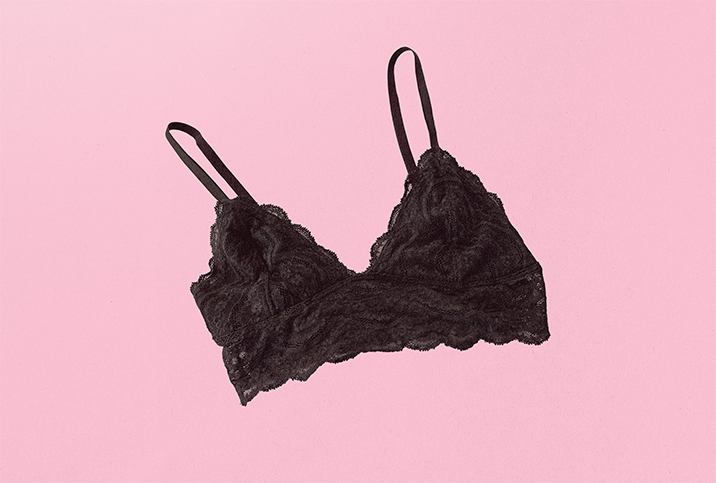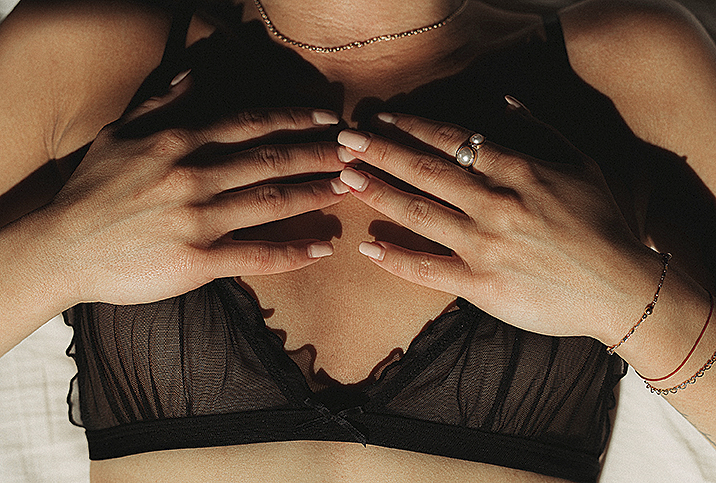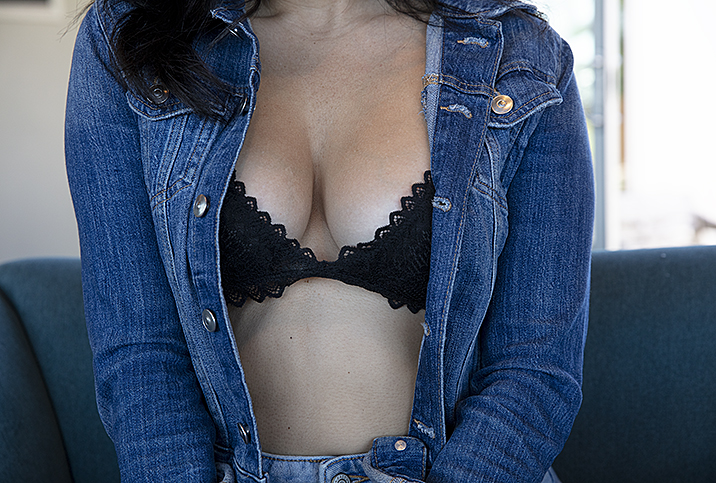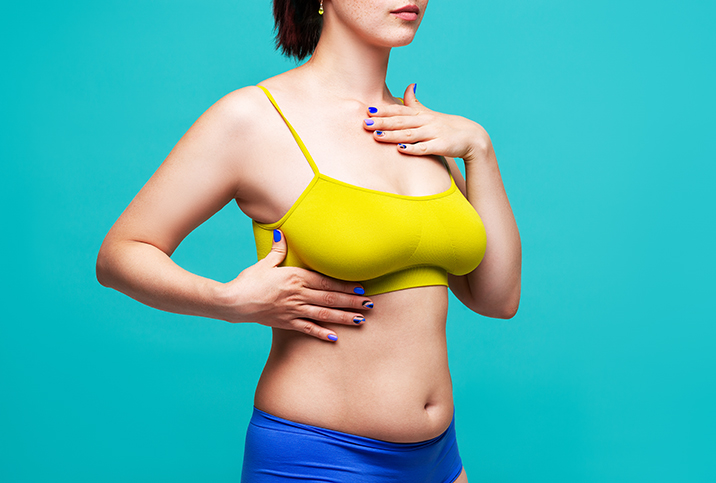Why Are My Breasts Getting Bigger After Menopause?
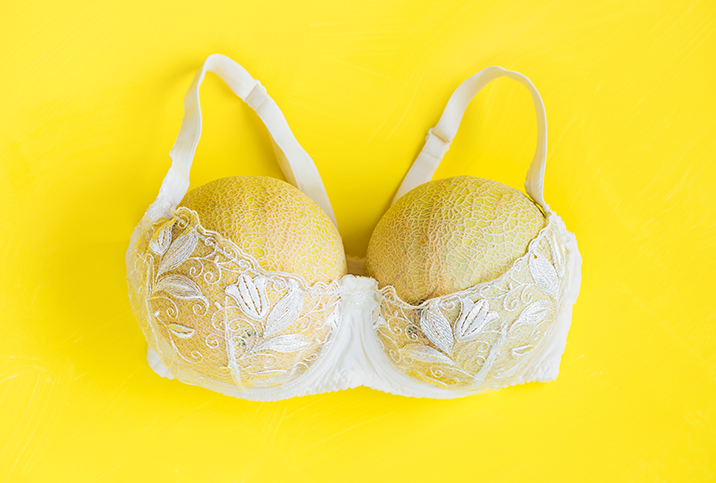
Menopause can cause changes throughout the whole body, but something you might not expect to see is a change in breast size.
In 2021, actress Salma Hayek shared her menopause experience on Facebook's Red Table Talk, a talk show hosted by actress Jada Pinkett Smith. She revealed that during a doctor's appointment, she was asked if she was irritable, crying for no reason, gaining weight quickly, shrinking or experiencing vaginal dryness.
"I'll tell you what they didn't tell you, 'Are your boobs growing?'" Hayak said. When asked if breasts grow during menopause, she replied, "Yes, the boobs grow—a lot.
"For some women, they get smaller. But there are some women that when you gain weight, your boobs grow, and other women that when you have children and you breastfeed, your boobs grow and they don't go back down," Hayak continued. "Then in some of the cases when you are in menopause, they grow again. And I just happen to be one of those women that it happened in every single step."
Hayak noticed her breasts had grown several sizes, which prompted some people to wonder if she had undergone breast augmentation.
"My back has been really suffering from it, and not a lot of people talk about this," she said.
Is this a common issue for women during the menopausal transition or is it a rare occurrence? We chatted with experts about menopause breast growth.
Do breasts get bigger after menopause?
Whether breasts get larger after menopause depends on who you ask.
Sarah Yamaguchi, M.D., a board-certified gynecologist at DTLA Gynecology in Los Angeles, said breasts usually do not grow after menopause.
On the other hand, Christine Greves, M.D., an OB-GYN at Orlando Health Winnie Palmer Hospital for Women & Babies, said breast enlargement is a common symptom that affects around 1 in 5 women.
A 2004 study that involved 1,130 postmenopausal women ages 54 to 71 found 18.6 percent of the women had to buy a bigger bra due to breast growth, while just 1.7 percent reported a reduction in breast size. A 2014 study with 208 women ages 45 to 65 revealed that 80 percent noticed a significant change in their breasts during aging.
So there is a connection between aging, menopause and breasts getting bigger, as well as other physical changes to the breasts.
What age do breasts stop getting bigger?
Breasts usually stop growing around age 17 or 18, though, for some women, they can continue to grow during their 20s, according to Greves.
Why do they suddenly grow after menopause for some women?
There are a few possible factors. Research on postmenopausal women has found the most important factor is weight gain, which Yamaguchi believes is the likely cause.
"Weight gain does tend to cause larger breasts, but fluctuations in estrogen levels around menopause can also cause it," she said.
Weight gain during menopause is common for many women. Hormonal changes can affect your gut microbiome and the way you metabolize fat. A natural part of aging is a loss of muscle mass, which can change your body shape.
Menopausal symptoms can be difficult to manage physically and mentally, so it's not surprising you may have less interest in exercise. There are many different reasons weight gain can occur but it's not inevitable. Increasing exercise, eating a whole-foods diet and cutting back on sugar and alcohol can all help.
While weight gain is one possible cause of breasts growing during menopause, genetics can play a role, too, Greves said.
If you have any concerns or questions or you are suffering with back pain due to breast growth or any other reason, speak to a healthcare professional who can help.
Are there other breast changes after menopause?
In addition to breast growth, other changes can occur.
"The more common symptom in the breasts around menopause is breast pain. The pain can be intermittent or cyclical," Yamaguchi said.
Hormonal changes often cause breast pain and tenderness. An ill-fitting bra can also contribute to this problem, so make sure you have a bra fitting to get your correct size.
"Breasts can become less firm with the transition due to less estrogen, so the ducts and mammary glands shrink also," Greves explained.
Breast sagging is also a very common issue as estrogen levels start to drop. The lack of estrogen affects the connective tissue that's responsible for keeping breasts firm and perky. Naturally, the shape of the breasts begins to change. There's very little you can do to prevent breast sagging, as it's a natural part of aging, but getting a fitted bra can help support your breasts and prove to be more comfortable.
Mood swings and hot flashes are difficult enough to deal with during the menopausal transition, but how about itchy breasts? Yes, this is another symptom of menopause. Loss of estrogen is probably to blame, but the reason could be that you are more sensitive to soap powders and scents now.
Switching to a natural soap powder or one formulated for sensitive skin can provide some relief. Additionally, remember to take your bra off overnight and during the day if you are sweating profusely, because the bra could contribute to irritation and itchiness.
Most importantly, if you experience symptoms of menopause that affect your quality of life, speak to your doctor about treatment options.












